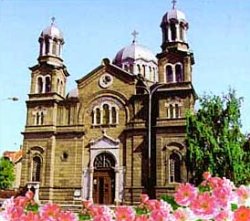|
|
| |
BULGARIA
BOURGAS
For the first time the name of Bourgas appeared as early as 1306 in a poem by Manuel Phil, Bysantium poet, as Pirgos - the Greek equivalent to the Latin word Burgos, i.e., 'the Tower': a name preserved in local legends, and dating as back as 1st or 2nd century AD, when a Roman travel station was functioning at the place of the present-day harbour.
The earliest life can be traced back to the Bronze and the beginning of the Iron Ages; while a 'number of finds, treasures and archaeological sites have witnessed to live activities during the Thracian epoch, that is to say the second half of 4 BC. Yoan Exarch, one of Bulgaria's pre-renaissance authors, wrote, 'The sea brings all that is distant together'. It is the sea itself that is shaping the appearance of Bourgas, the spirit of its people and the original atmosphere due to century-old contacts with various nations and civilizations Bourgas has always been open to the world and the world's economy and culture by means of its harbour, where more than 1,500 vessels and a large number of petroleum tankers are mooring each year. The Port of Bourgas is the biggest seaport in the country.
 Bourgas is host to the famous
International Folklore Festival. It was created in 1965 and since then it has gained international prestige as a result of its high professionalism and the authenticity of the peoples' traditional wealth.
In 1978 it was granted membership of The International Council of the Organizers of Folklore Festivals- CIOFF.
Since 2001 it is a member of the International Festivals & Events Association Europe /IFEA/.
Every year representatives of different continents meet at the seashore to present the folk heritage they bear deep in themselves.
Concerts in Bourgas and its region,
a festive defile,
a scientific conference, traditional souvenirs exhibition with bazaar, folk crafts workshop, photographing and videotaping of the festival activities are also included in the Program of the International Folklore Festival.
|
|
|
Festivals and Fairs
The Great Koprivshtitza Folklore Festival
The Great Koprivshtitza Folklore Festival is Bulgaria's largest gathering of traditional musicians and singers and is a cross between a pop festival and a medieval fair. It is a sight that knows no equal: thousands of musicians and singers making the hillside above the picturesque village of Koprivshtitza their home for a few days. Coupled with this you have the colourful stalls of the traders and the thousands of visitors who come for the festival.
This is Bulgarian music as it was always played, played by the ancestors of those who first played it. But perhaps it is what happens on the periphery that is the most authentic. Strolling players or soloists, simply playing for the sheer enjoyment. forming new bonds with other musicians or just letting their music ring out over the hillside.
The Bourgas International Folk Festival
The Bourgas International Folk Festival, held annually, attracts a host of Bulgarian and international artists and is held in the second half of August.
The Kazanluk Festival
The Kazanluk Festival of the Roses is held annually in early June, and has grown from a local to an international event. Not only are the roses, Kazanluk's main industry, in full flower. but the town itself blossoms while visitors enjoy the "Rose Picnic" and all the fun of a folklore festival, with its costumes, songs and dance. Should you still have the energy left, you can always visit the old factories where the rose oil is extracted.
St. Trifon's Day
In the agricultural calendar, St. Trifon's Day celebrates the pruning of the vines, and is held on February 14.
Kukerov Den
On the first Sunday before Lent, Kukerov Den celebrates the start of the agricultural year, and all over Bulgaria you can witness processions led by the dancing. leaping Kukeri dressed in colourful masks and costumes.
Baba Marta
Baba Marta is celebrated on March 1 when peasant house-holds brush out the winter cobwebs with a traditional spring clean. and people offer each other tokens of good luck called martenitsas.
Kukeri
Like western countries. the Bulgarian calendar is dotted with important feast days and festivals. The festival of the Kukeri re-enacts ancient surovaki rites to ward off evil spirits and Kukeri fertility rites. Although only held once every five years, it brings together dancers from all over Bulgaria in a rainbow of colours and styles.
St. Lazarus Day
Lazaruvane is also celebrated in spring on St. Lazarus Day, and here village girls considered fit for marriage perform ritual songs and dances.
St. Konstantin and St. Elena Day
The coming of summer is traditionally celebrated on St. Konstantin and St. Elena Day on May 21, and in some of the remoter villages in the Stranzha hills fire dancing, dancing on heated coals, is still practised in celebration of summer's arrival. Ethnologists have suggested that this practice is directly descended from Dionysina rites of the ancient Thracian.
|